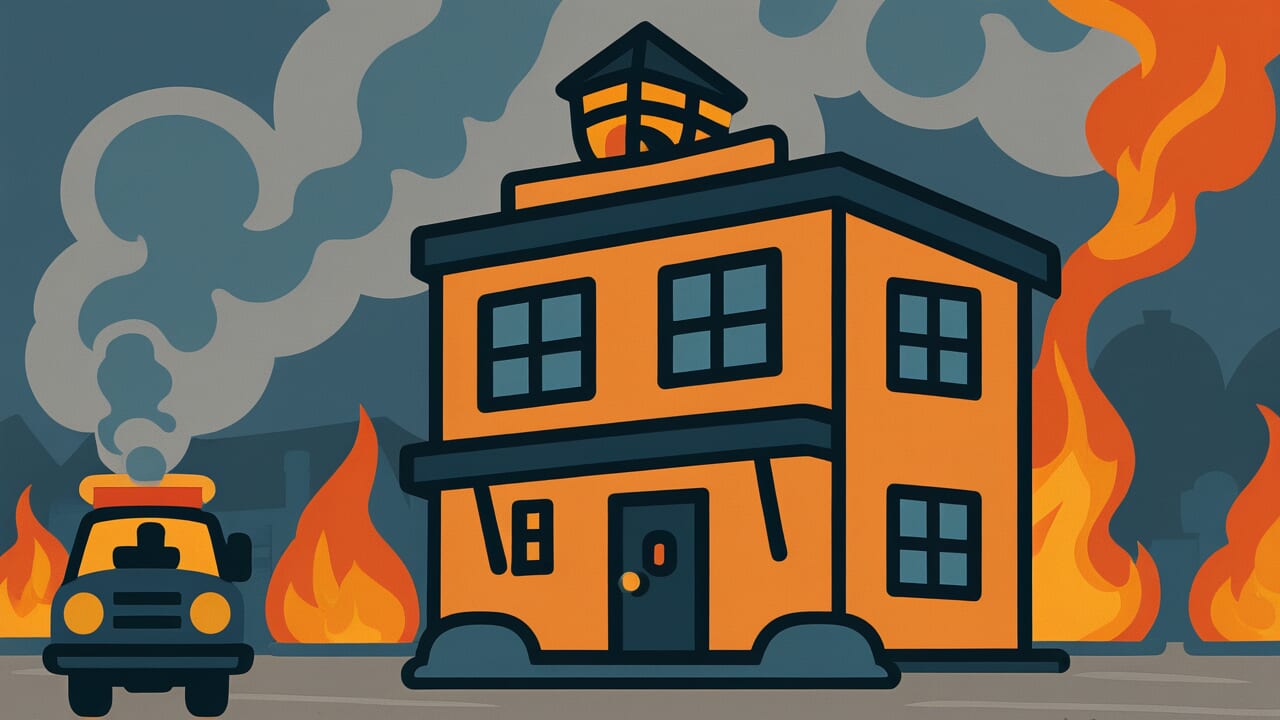How to Read “Even a firefighter’s house has a fire”
Hikeshi no ie ni mo kaji
Meaning of “Even a firefighter’s house has a fire”
“Even a firefighter’s house has a fire” means that even experts can fail in their own field of expertise.
Just as a firefighter’s house can catch fire despite their profession being to prevent and extinguish fires, professionals can fail in the very area they know best.
This happens through carelessness, overconfidence, or unexpected circumstances.
This proverb applies when doctors neglect their own health and get sick, when chefs fail at cooking at home, or when safety experts cause accidents.
It points out a human weakness: having expert knowledge can actually make people neglect basic precautions.
Even today, security experts get hacked, and traffic safety instructors commit traffic violations.
These examples never stop appearing. This proverb teaches a universal lesson: no matter your position, you must never forget humility.
Origin and Etymology
No clear written records explain the origin of this proverb. However, it likely comes from the “hikeshi” firefighting organizations of the Edo period.
Edo was a city so prone to fires that people said “fires and fights are the flowers of Edo.”
Wooden houses stood close together. When fire broke out, it often became a major disaster.
This led to the development of firefighting organizations called “machi-hikeshi.” Firefighters became familiar and reliable figures to Edo residents.
Firefighters knew the terror of fire better than anyone. They were experts with knowledge and skills in fire prevention.
They rushed to fire scenes daily and risked their lives fighting flames. People naturally assumed firefighters’ own houses would be the most careful about fire safety.
Yet even firefighters’ houses sometimes caught fire. This ironic reality likely gave birth to this proverb.
No matter how much knowledge you have or how careful you are, humans can still fail.
This lesson was expressed through the concrete profession of firefighting. The saying spread among people as a warning against experts’ carelessness and overconfidence.
Interesting Facts
Edo period firefighters mainly used “destructive firefighting” rather than actually extinguishing fires.
They demolished buildings around the fire source to stop the spread. This method prevented the fire from spreading further.
Firefighters needed a tool called “tobiguchi” to pull down buildings. Their work was more about fire prevention using construction knowledge than actual firefighting.
Firefighters wore cotton-padded jackets soaked in water. These protected them from sparks, but reportedly weighed over 10 kilograms.
Firefighters who ran around fire scenes wearing this heavy gear needed extraordinary physical strength.
Usage Examples
- That famous chef caused food poisoning at his own restaurant. It’s truly “even a firefighter’s house has a fire.”
- A security company getting hit by a cyberattack is exactly what “even a firefighter’s house has a fire” means.
Universal Wisdom
The proverb “even a firefighter’s house has a fire” contains deep wisdom about human weakness and the paradoxical dangers that expertise brings.
We tend to think that mastering a field makes us immune to failure in that area.
But the opposite actually happens. Being an expert makes us neglect basic precautions.
Having knowledge creates overconfidence that we’ll be fine. Repeating the same tasks daily makes us lose our sense of alertness.
This is a timeless aspect of human nature.
Looking deeper, this proverb points to a fundamental human problem: the gap between knowledge and practice.
Understanding something intellectually doesn’t mean we can consistently act on it. We can strictly guide others but be lenient with ourselves.
These contradictions arise because humans possess both reason and emotion.
There’s also a social dimension: experts’ failures stand out more than others’. Mistakes that might be forgiven in ordinary people aren’t forgiven in experts.
Under this pressure, experts may actually invite failure. This proverb perhaps contains understanding for the loneliness and struggles experts face.
Our ancestors condensed these truths into this short phrase: no human is perfect, and the armor of expertise can sometimes become a blade that wounds us.
When AI Hears This
Firefighters causing fires stems from cognitive traps that expert knowledge creates.
Risk compensation theory explains this: humans unconsciously reduce attention when they feel safer.
Seatbelt research showed that after mandatory seatbelt laws, more drivers drove recklessly. The sense of being protected actually encouraged dangerous driving.
Firefighters follow the same pattern. Knowing how to handle fires creates overconfidence: “Even if fire breaks out, I can put it out.”
This psychological comfort leads to neglecting basic precautions like forgetting to turn off the stove or smoking in bed.
Interestingly, this phenomenon increases with expertise level. Beginners maintain constant alertness due to limited knowledge, but veterans develop “familiarity.”
Medical research shows veteran nurses tend to skip handwashing more often. Skill accumulation becomes not a defensive wall but a solvent that dissolves the most basic defense: attention.
This proverb recognized centuries ago the troublesome characteristic of the human brain: its automatic adjustment of safety margins.
Lessons for Today
This proverb teaches modern people the importance of never forgetting beginner’s mind and valuing basics, regardless of position.
If you’re an expert in something or have accumulated experience in a field, this proverb speaks directly to you.
Knowledge and experience are valuable assets. But the moment they lead to overconfidence, they transform into your greatest weakness.
Modern society advances specialization. Everyone is expected to become an expert in some field.
But the more expert you become, the more you need time to regularly reflect and return to basics.
Recognizing that “I’ll be fine” thinking is the biggest risk matters most.
This proverb also teaches us kindness. When experts fail, we shouldn’t simply blame them.
We should understand that failure can happen to anyone who is human. Don’t demand perfection.
Learn from mistakes and stand up again. Such flexible attitude may define true professionalism.



Comments